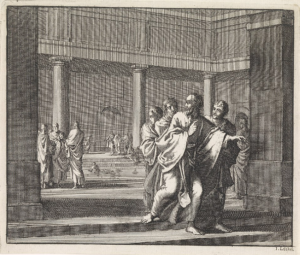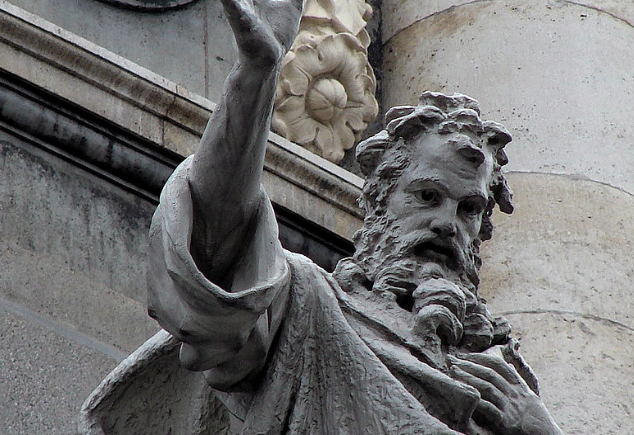Should all Christians care about proper theological belief? Should we call it out when others who claim the name of Christ veer off into heretical belief and teaching?
Increasingly, Christians tend to answer both questions in the negative. They see making waves about heavy biblical truth as the opposite of being “winsome” which has curiously become a new Fruit of the Spirit. But it is not.
But what about the early Christians? How did they deal with false teaching in their midst?
It is an important question. And the answer is that from the beginning, Christian leaders took the careful teaching of orthodoxy and the rebuke of heretics extremely seriously. Let’s just look at history.
One of the earliest and most destructive heresies the church fathers had to correct was Gnosticism, which questioned the nature of God and His created world, the humanity of Jesus, and how we know truth. Yes, very fundamental issues.
Over and against this challenge, rose the great Irenaeus (Ir-re-ney-us), a mere two generations removed from Jesus Himself. His name means peaceable as in “being irenic.” But he was also an absolute tiger when it came to defending the truth of Christianity. Irenaeus was taught in his youth by the martyr Polycarp who was taught by the Apostle John, the author of the fourth gospel, three epistles, and Revelation, as well as being the one Jesus chose to care for his own mother just before he died. The man has a strong spiritual lineage. In fact, Irenaeus explains in a letter to a fellow church leader,
I can describe the place where blessed Polycarp sat and talked … his personal appearance, his addresses to crowded congregations. I remember how he spoke of his intercourse with John and with the others who had seen the Lord; how he repeated their words from memory; and how the things that he had heard them say about the Lord, His miracles and His teaching, things that he had heard direct from the eye-witnesses of the Word of Life, were proclaimed by Polycarp in complete harmony with Scripture.
Irenaeus was Christianity’s first systematic theologian, writing the first major book of Christian apologetics, an absolute powerhouse of theological teaching and rebuke. The name of the weighty tome is Against Heresies.
Irenaeus is not winsome in calling out the heretics pushing this false and destructive teaching. He calls them “those malignant-minded people.” He also explains to his readers that he is in very good company with his strong denunciations, wanting his readers to know orthodox Christianity must be crystal clear in distinguishing truth from falsehood and that it has been from the very start.
Irenaeus tells two very colorful real-life stories from the Apostle John and his faithful student Polycarp. The first concerns John and an incident at an Ephesian bathhouse.
John, the disciple of the Lord, going to bathe at Ephesus, and perceiving Cerinthus within, rushed out of the bath-house without bathing, exclaiming, “Let us flee, lest even the bath-house fall down, because Cerinthus, the enemy of the truth, is within.”
Cerinthus was an early gnostic and a contemporary opponent of John’s. In fact, early Christian sources say John uniquely crafted his powerful gospel with the refutation of Cerinthus’ heresy in mind. And note that John didn’t point out that Cerinthus was merely mistaken but called him “the enemy of the truth.” He spoke to the man’s ill intention, fearing for the severe judgement of God upon such a person. And the Apostle’s bath-house exit was famous enough to be commemorated by artists for the faithful.

(Image Credit: Wikipedia – Jan Luyken, John and the heretic Cerinthus in the bathhouse, 1701)
Irenaeus shares another story about Polycarp meeting Marcion, one of the most famous Christian heretics of his day. Upon the two men meeting, Marcion asked Polycarp, “Dost thou know me?”
Polycarp responded immediately, “I do know thee, the first-born of Satan.”
The subtlety was not lost on Marcion. Then Irenaeus explains, “Such was the horror which the apostles and their disciples had against holding even verbal communication with any corrupters of the truth.” (See Against the Heresies, Book 3, chapter 3, section 4)
Such actions are exactly in line with Paul’s words to Titus where he teaches, “After a first and second warning reject a divisive man [who promotes heresy and causes dissension—ban him from your fellowship and have nothing more to do with him]…” (Titus 3:10 AMP)
Paul also told the Corinthians that there is a hidden blessing in the arising of divisive heretics within the church “in order that those who are genuine among you may be recognized.” (I Corinthians 11:19 ESV) Of course, the recognition of the genuine is made when heretical teaching is clearly and publicly pointed out to all the faithful.
Remember, there is nothing new under the sun.
Dangerous heresies existed in the earliest days of the Church from so-called believers, and they exist today. Faithful Christian teachers denounced them at the time in strongest terms. We are called to do the same today in no uncertain terms because as Paul taught, it is how we know what the truth is.
And the earliest fathers of our faith certainly did not concern themselves with hurt feelings. They were more concerned with the defense of true doctrine.






